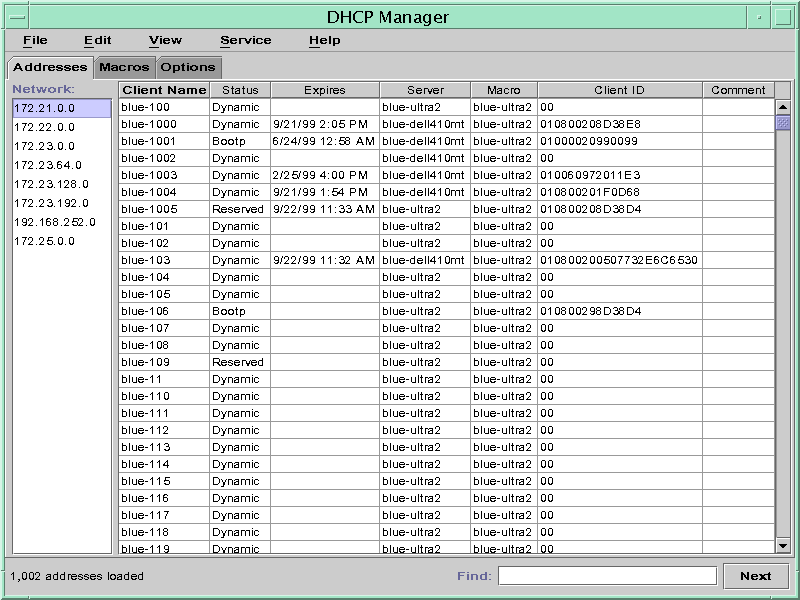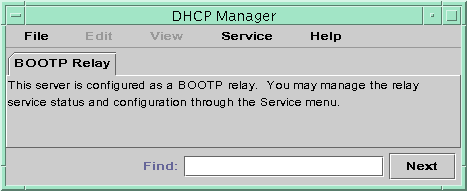DHCP Manager
DHCP Manager is a graphical interface you can use to perform administration tasks on the DHCP service.
The DHCP Manager Window
The DHCP Manager window's appearance differs, depending on whether the server on which it is running was configured as a DHCP server or a BOOTP relay agent.
When the server is configured as a DHCP server, DHCP Manager uses a tab-based window, in which you select a tab for the type of information you want to work with. DHCP Manager features the following tabs:
-
Addresses – Lists all networks and IP addresses placed under DHCP management. From the Addresses tab, you can add or delete networks and add or delete IP addresses individually or in blocks. You can also modify the properties of individual networks or IP addresses or make the same property modifications for a block of addresses simultaneously. When you start DHCP Manager, it opens on the Addresses tab.
-
Macros – Lists all macros available in the DHCP configuration database (dhcptab) and the options contained within them. From the Macros tab, you can create or delete macros, and modify them by adding options and providing values for the options.
-
Options – Lists all options that have been defined for this DHCP server. Options listed on this tab are not the standard ones defined in the DHCP protocol. The options are extensions to the standard options, and have a class of Extended, Vendor, or Site. Standard options cannot be changed in any way so they are not listed here.
The following figure shows the DHCP Manager window as it appears when you start it on a DHCP server.
Figure 10–1 DHCP Manager on a DHCP Server System

When the server is configured as a BOOTP relay agent, the DHCP Manager window does not show these tabs because the BOOTP relay agent does not need any of this information. You can only modify the BOOTP relay agent's properties and stop/start the DHCP daemon with DHCP Manager. The following figure shows the DHCP Manager window as it appears when you start it on a system configured as a BOOTP relay agent.
Figure 10–2 DHCP Manager on a BOOTP Relay Agent System

DHCP Manager Menus
-
File – Exit DHCP Manager
-
Edit – Perform management tasks upon networks, addresses, macros, and options
-
View – Change the look of the tab currently selected
-
Service – Manage the DHCP daemon and data store.
-
Help – Open your web browser and display help for DHCP Manager
When DHCP Manager runs on a BOOTP relay agent, the Edit and View menus are disabled.
All DHCP service management activities are accomplished through the Edit and Service menus. You use the commands in the Edit menu to create, delete, and modify networks, addresses, macros, and options, depending on which tab is selected. When the Addresses tab is selected, the Edit menu also lists wizards, which are sets of dialogs that make it easy to create networks and multiple IP addresses. The Service menu lists commands that enable you to manage the DHCP daemon. You can start/stop, enable/disable, modify the server configuration, and unconfigure the server. The Service menu also lists commands that enable you to convert the data store and export and import data on the server.
Starting and Stopping DHCP Manager
You must run DHCP Manager on a DHCP server system as superuser, but you can display it remotely on another UNIX system using the X Window remote display feature.
How to Start and Stop DHCP Manager
-
If you are logged in to the DHCP server system remotely, you can display DHCP Manager on your local system as follows.
-
Type the following command:
# /usr/sadm/admin/bin/dhcpmgr &
The DHCP Manager window opens, displaying the Addresses tab if the server is configured as a DHCP server, or no tabs if the server is configured as a BOOTP relay agent.
-
To stop the DHCP Manager, choose Exit from the File menu.
- © 2010, Oracle Corporation and/or its affiliates
